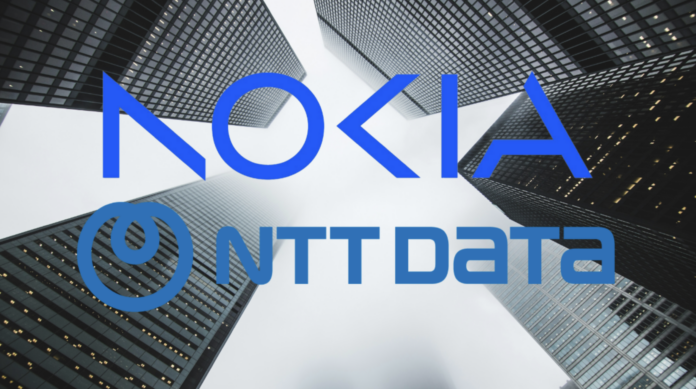ALERT: Last chance to sign up for the RCR Wireless webinar on how to scale private 5G in Industry 4.0 (‘balancing customisation and simplicity in private industrial 5G networks’) on October 10 2024, featuring speakers from CCS Insight, Ericsson, EXFO, and Verizon Business. Sign up here.
Finally, Nokia and NTT DATA have tied the knot on private 4G and 5G sales. Having combined for a number of years on ad hoc deployments in regional markets without ever formalising the affair, the two companies, both heavy hitters in the private networks game, have made their relationship official at last in a global go-to-market RAN deal. They called it an “expansion” of a “multi-year partnership” – even though both firms have been reluctant until now to discuss the tactical nature of their arrangement.
Curiously, Nokia has rarely, if ever, been cited in NTT DATA’s flurry of big private 4G/5G deals. By contrast, NTT DATA’s partnerships with Celona, repeatedly, and also Cisco, occasionally, have been talked about and referenced every time it sells into enterprises. But news out of MWC Las Vegas today (October 7) is that the UK-headquartered system integrator’s headline contracts with the City of Brownsville in the US (their “the first North American deployment”) and with Frankfurt and Bonn airports in Germany are all underpinned by Nokia’s radio access network (RAN) gear.
Its most public Nokia reference, to date, has been in Thailand, where the pair said they have deployed at “multiple enterprise business parks” in the country and are targeting a total addressable market (TAM) of 3.2 million enterprises. The Brownsville deployment in Texas in the US, announced last month, is being positioned as their first joint work as a proper couple. The town has already been transformed from one of the worst connected in the US to one of the best, says the marketing.
The pair said they will target “key sectors such as ports, airports, and smart cities”; presumably they will also partner on discrete and process manufacturing, oil and gas, mining, and other hard-nosed Industry 4.0 markets – where Nokia, in particular, has been strong. Whether or not they cross into sports and entertainment venues – and hospitality and healthcare, for example, where NTT has tended to select private 4G/5G solutions from Celona and Cisco – is unclear.
Nokia has always advocated the strength of its RAN portfolio in the mission-critical Industry 4.0 space – versus these others, which have characterised themselves as more IT-centric. It also makes-play of its core network, clearly, plus innovations with industrial edge hardware and software, which include server architecture itself, plus devices, wearables, drones, and various in-house and third-party applications. It is unclear how far NTT DATA will promote and sell these other solutions. The UK firm has its own private 5G “platform” and enterprise IoT portfolio to push.
A press statement talks only about combining Nokia’s “private 5G RAN” and NTT DATA’s “technology services”. As such, it might (!) appear that NTT DATA will exercise its right to pair Nokia RAN equipment with core 5G network solutions from Celona and Cisco. However, it has responded that such a conclusion is “inaccurate”. The press statement says: “Nokia’s ‘anyRAN-for-enterprise’ approach offers more choice and flexibility for enterprises through collaboration with best-in-class systems integrators… and cloud core solution providers alongside Nokia’s AirScale RAN portfolio – to suit specific requirements and accelerate and simplify the adoption of private 5G.”
It references their combined “experience and industry blueprint”, highlighting Nokia’s extensive experience in deploying “global, large-scale (macro) network solutions” (rather than its smaller DAC-based enterprise ones) and NTT DATA’s integration of IT and OT applications, as well as both firm’s “innovative applications” with AI, IoT, and edge computing. Apart from that, the watchwords are about “secure and scalable” private 5G, with an emphasis on “airports and smart cities”; the Brownsville project will be used as a template for “public safety [and] operational scalability” for “critical business and municipal operations”.
The supplied quotes said the same things, as follows.
Shahid Ahmed, executive vice president of edge services at NTT DATA, said: “We’re seeing an unprecedented demand for flexible, high-performance private networks. With NTT DATA’s globally available private 5G platform, we’re uniquely positioned to deliver solutions that meet the needs of today’s industries while ensuring long-term operational resilience. Our partnership with Nokia’s private 5G RAN allows us to bring our combined strengths to airports, cities, and beyond – delivering scalable, secure, and high-speed connectivity that accelerates digital transformation.”
Mark Atkinson, head of RAN at Nokia, said: “We are proud to collaborate with NTT DATA to deliver best-in-class network solutions that enhance public services and accelerate the digital transformation of key sectors such as smart cities and airports. Nokia’s private 5G RAN, combined with NTT DATA’s technology services, creates the ideal platform for a wide range of use cases and we look forward to partnering on further innovations together.”
ALERT: Don’t miss Industrial 5G Forum, a one-day virtual event on November 5, to hear about the state of the private / industrial 5G market. Sign up here.



